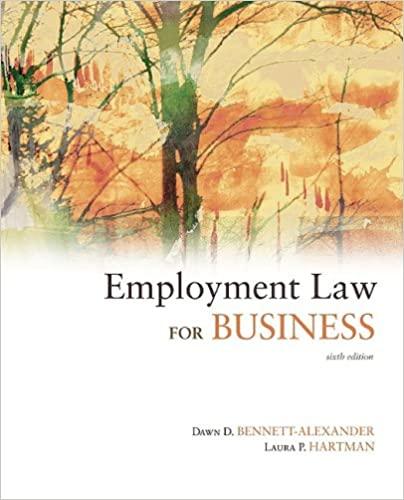Question
Please case brief: include Name of Case, facts, issue as question, holding, rationale Case Limited Partnerships Supreme Court of Pennsylvania. Commonwealth of Pennsylvania, Department of
Please case brief: include
Name of Case, facts, issue as question, holding, rationale
Case Limited Partnerships Supreme Court of Pennsylvania. Commonwealth of Pennsylvania, Department of Revenue for the Bureau of Accounts Settlement, Appellee, v. Patrick J. Mckelvey, Peter Bradley T/A Different Spokes. Appeal of Peter Bradley T/A Different Spokes. No. 81 E.D. Appeal 1990. Argued Jan. 15, 1991. Decided March 7, 1991. Opinion of the The issues raised by this appeal are whether appellant, Peter Bradley, received actual notice of a tax assessment against the business in which he was a limited partner, and whether appellant, as a limited partner, was liable for a partnership debt under the Uniform Limited Partnership Act. Appellant is a school teacher who was requested by Patrick McKelvey to provide the financial backing for a retail bicycle business. The two men entered into a limited partnership agreement, and appellant provided an $18,000.00 loan to the business. As a limited partner, appellant took no part in the operation or management of the bicycle shop. McKelvey, as general partner, handled all of the purchases, sales, and financial aspects of the business. Identifying himself as the partnership's "principal" partner (we interpret this as meaning the partnership's general partner), McKelvey filed an application for sales, use, and hotel occupancy license with the Department of Revenue of the Commonwealth of Pennsylvania, and designated appellant as a limited partner in the business, which was known as "Different Spokes." On October 10, 1985, appellee, Common-wealth of Pennsylvania, Department of Revenue for the Bureau of Accounts Settlement, mailed a notice of sales and use tax assessment to the business address of Different Spokes for a series of tax periods beginning July 1, 1983, and ending June 30, 1985, in the amount of $17,636.86. The total assessment amounted to $27,974.21 with penalties and interest. No challenge was made to this assessment nor was the assessment paid. In April of 1986, appellee issued liens in the amount of $27,974.21 against the business and its general and limited partners. Appellant, who had not been individually notified of the assessment by the appellee, did not discover the lien that had been filed against properties he owned until he was conducting a title search several months thereafter during a routine application for a mortgage. Appellant promptly filed a Petition to Strike Tax Lien in the Court of Common Pleas of Delaware County. That court determined that its jurisdiction was limited to the question of whether or not appellant had received notice of the assessment. The common pleas court then held that notice to the partnership constituted notice to the appellant, and thus,that the appellant had received notice of the assessment. Accordingly, appellant's petition to strike tax lien was denied. Appellant filed an appeal to Commonwealth Court which affirmed, holding that the notice of tax assessment sent to the limited partnership was "sufficient to support the lien entered against [appellant] as a limited partner."... We granted appellant's petition for allowance of appeal, and we now reverse. The trial court erred in holding that notice to a partnership constitutes notice to a limited partner. The trial court also erred in holding by implication that the personal assets of a limited partner can be liened to satisfy the debt of a limited partnership. As a matter of law, notice to a limited partnership can never constitute notice to a limited partner. A limited partner has no role in the exercise, control or management of the limited partnership business. Limited partners, by statutory definition, do not take part in the control or management of partnership business. Section 521 of the Uniform Limited Partnership Act which was in effect at the time of the events giving rise to this litigation provided as follows: A limited partner shall not become liable as a general partner unless, in addition to the exercise of his rights and powers as a limited partner, he takes part in the control of the business. 59 Pa.C.S.A. 521 (now repealed). Appellant was a limited partner and did not take part in the control or management of Different Spokes; accordingly, the notice received by the partnership of the tax assessment did not constitute actual notice to appellant ....Finally, it is the law of this Commonwealth that a limited partner is not liable for the obligations of the limited partnership.... Thus, assuming proper notice to appellant, his liability would be limited. Accordingly, we reverse the decision of the commonwealth court, and we remand to the court of common pleas of Delaware County for the entry of an order granting appellant's petition to strike tax lien. Note: In this case, the court made it clear that the limited partner who did not take part in the control of the business was not personally liable for the tax obligations of the limited partnership.
Step by Step Solution
There are 3 Steps involved in it
Step: 1

Get Instant Access to Expert-Tailored Solutions
See step-by-step solutions with expert insights and AI powered tools for academic success
Step: 2

Step: 3

Ace Your Homework with AI
Get the answers you need in no time with our AI-driven, step-by-step assistance
Get Started


